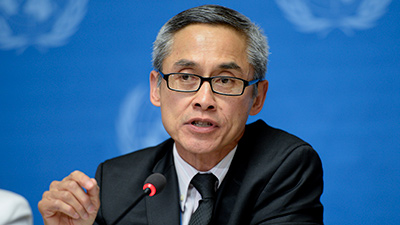Vitit Muntarbhorn
Former Independent Expert on sexual orientation and gender identity (2016-2017)

Mr. Vitit Muntarbhorn (Thailand) was designated in September 2016 as the first UN Independent Expert on violence and discrimination based on sexual orientation and gender identity by the Human Rights Council. Mr. Muntarbhorn is an international law Professor. He was educated in the United Kingdom obtaining his undergraduate and graduate law degrees from Oxford University. He also holds a degree on European law from the Free University of Brussels. He is currently a Professor Emeritus of law at the Chulalongkorn University in Bangkok, having taught international law, human rights, the law of regional organizations, migration and refugee law, child rights, international humanitarian law and European Union law. He was awarded the UNESCO Human Rights Education Prize in 2004.
Prof. Muntarbhorn has served on many United Nations bodies. He was formally the United Nations Special Rapporteur on the situation of human rights in the Democratic People’s Republic of Korea. He has also been Special Rapporteur of the UN Commission on Human Rights on the Sale of Children, Child Prostitution and Child Pornography. He was the Chair of the International Commission of Inquiry on the Ivory Coast in 2011 and was one of the Commissioners of the Independent International Commission of inquiry on Syria from 2012 to 2016.
Prof. Muntarbhorn has extensive experience in research, policy development and advocacy in the field of sexual orientation and gender identity. He was the Co-Chairperson of the drafting committee of the Yogyakarta Principles on the Application of International Human Rights Law in relation to sexual orientation and gender identity in 2006. He is the author of many publications on human rights issues, including sexual orientation and gender identity.
Highlights
In his inaugural report, presented at the Human Rights Council in June 2017 (A/HRC/35/36), Independent Expert Vitit Muntarbhorn identified six underpinnings for the mandate on protection from violence and discrimination based on sexual orientation and gender identity:
- the decriminalization of consensual same-sex relations and of gender identity and expression;
- effective anti-discrimination measures
- the legal recognition of gender identity
- destigmatization linked with depathologization
- sociocultural inclusion; and
- education with empathy.
He addressed the first two issues in his report to the General Assembly in 2017 (A/72/172) but had to resign effective 31 October 2017. His research agenda was however pursued by his successor, Mr. Victor Madrigal-Borloz, who addressed the other topics in his thematic reports in 2018 and 2019.